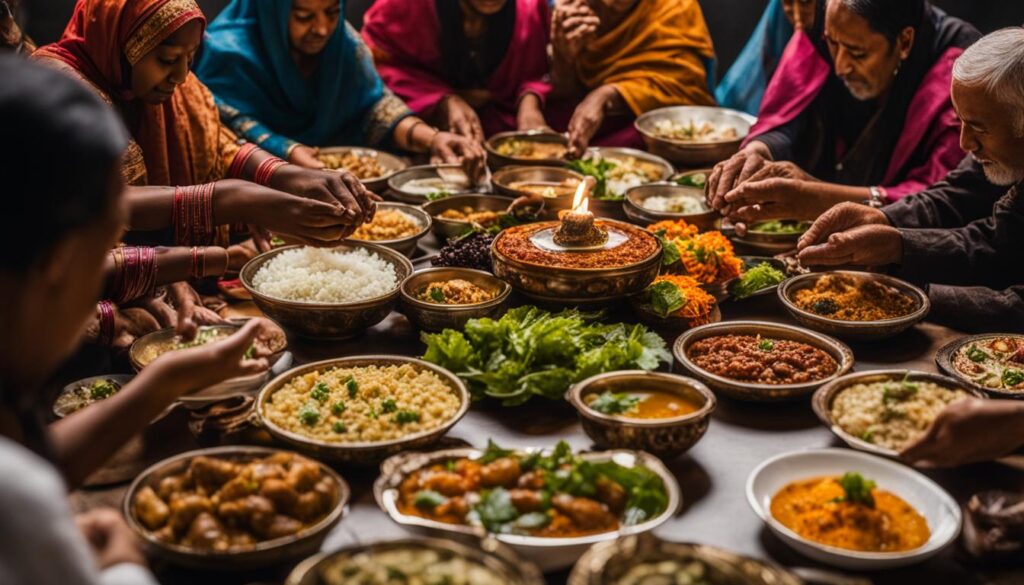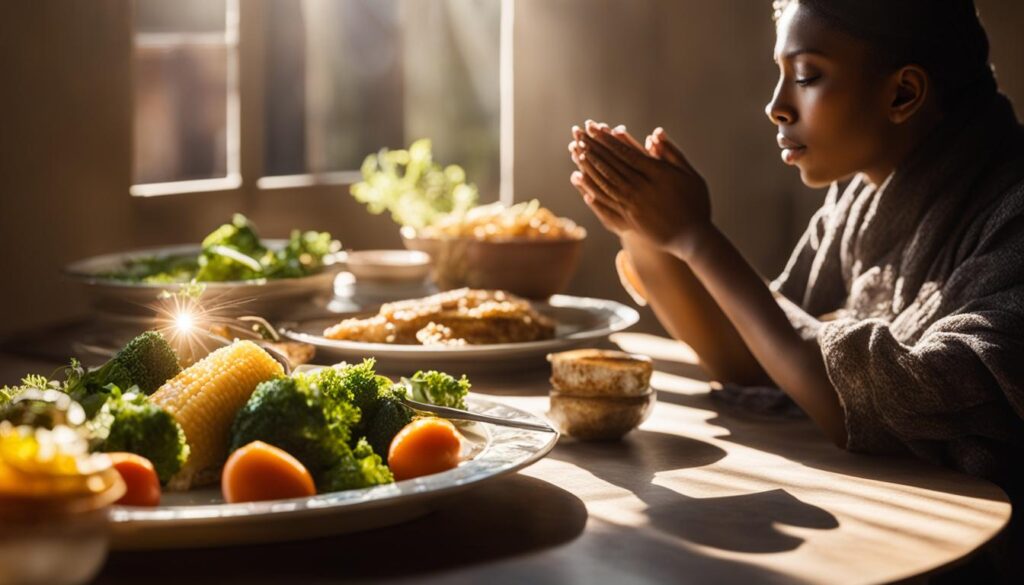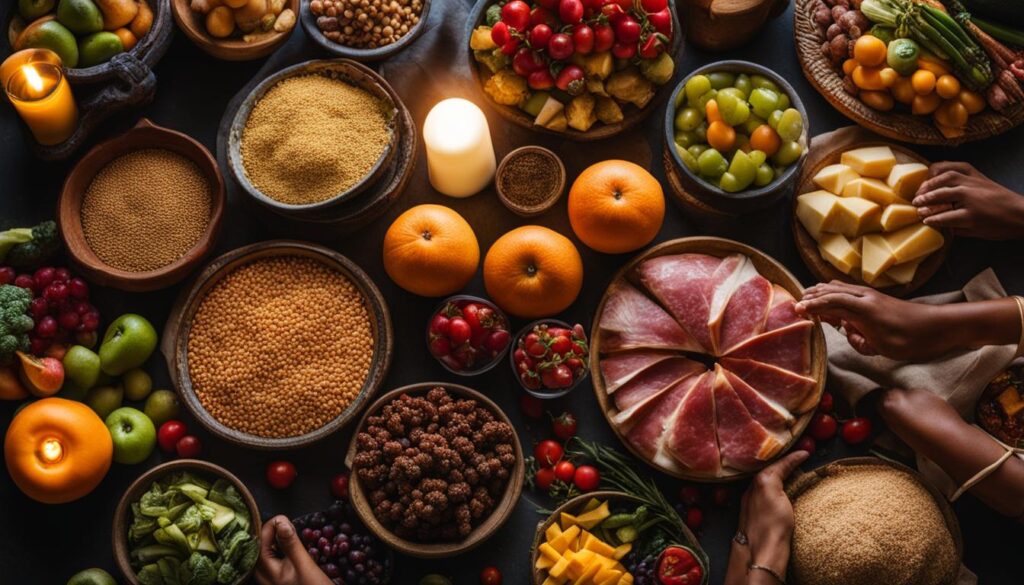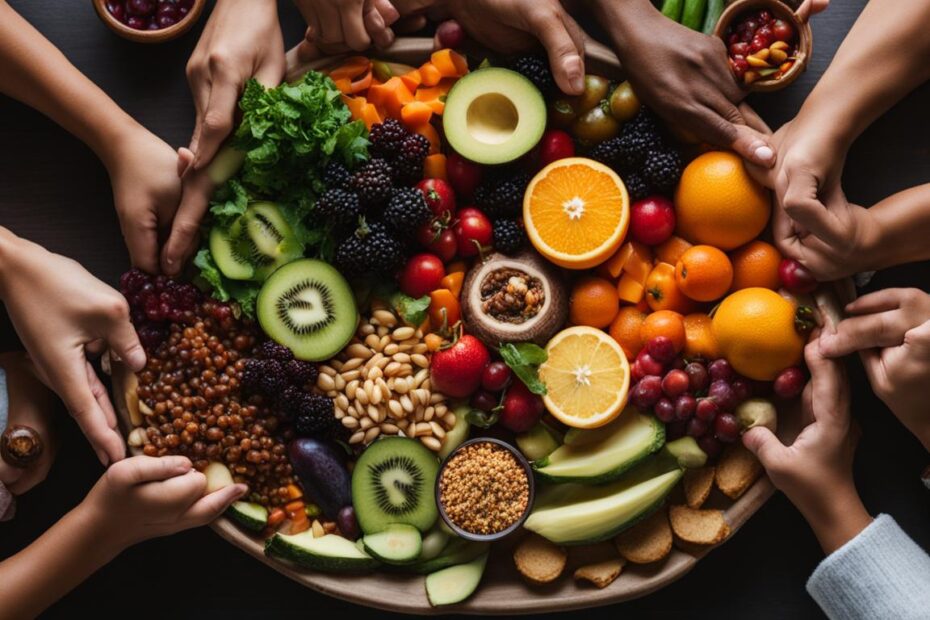Praying before meals has been practiced by many cultures and religions as a way to express gratitude for the food we are about to eat. It can be a meaningful spiritual practice that fosters a sense of appreciation and thankfulness. In this article, we will explore different methods and techniques on how to pray for food properly, allowing you to unlock blessings and connect with a deeper sense of nourishment and gratitude in your meals.
Key Takeaways:
- Praying before meals is a powerful way to express gratitude for the food we eat.
- It is a meaningful spiritual practice that can foster a deeper connection to nourishment and gratitude.
- In this article, we will explore different methods and techniques on how to pray for food properly.
- By incorporating prayer into your mealtime routine, you can unlock blessings and cultivate a greater appreciation for the food you consume.
- Praying for food can be a transformative practice that nourishes the mind, body, and spirit.
The Power of Prayers: Personal Experiences and Benefits
Praying before meals has a profound impact on individuals, offering personal experiences and various benefits. Incorporating prayers into the mealtime routine cultivates mindfulness, gratitude, and connection to something greater than ourselves. It serves as a moment of pause, allowing us to reflect on and express gratitude for the food we are about to consume.
Engaging in this spiritual practice creates a deeper appreciation for the nourishment provided by the food and the hands that prepared it. Many individuals have reported experiencing positive effects on their mental and emotional well-being after incorporating prayers into their mealtime routine. The act of expressing gratitude regularly through prayers has been found to improve mood, reduce stress, and increase resilience.
Praying for food is a spiritual practice that resonates with people from different cultures and beliefs. It fosters a sense of connection and gratitude for the sustenance we receive. By engaging in this practice, individuals can unlock blessings and cultivate a heart full of thankfulness.

The Benefits of Praying for Food
“Prayer is not asking. It is a longing of the soul. It is daily admission of one’s weakness. It is better in prayer to have a heart without words than words without a heart.” – Mahatma Gandhi
Praying for food goes beyond the act of nourishing our bodies; it nourishes our minds and spirits as well. It shifts our focus from the stresses of the day to a moment of gratitude and connection. The practice of expressing thanks for the food on our plates and the people who contributed to the meal fosters a sense of calm, contentment, and overall well-being.
The Transformative Power of Praying for Food
The act of praying for food has the power to transform our relationship with food and the world around us. It allows us to recognize the abundance and blessings in our lives, fostering a mindset of gratitude and contentment. By incorporating prayers into our daily lives, we can create a habit of mindfulness, gratitude, and connection to the divine. This practice nourishes not only our bodies but also our minds and spirits, opening the door to a deeper sense of appreciation for the nourishment we receive.
| Benefits of Praying for Food | Meaning and Impact |
|---|---|
| 1. Cultivates mindfulness | Prayer before meals allows for a moment of pause and reflection, cultivating mindfulness and awareness of the present moment. |
| 2. Fosters gratitude | Expressing gratitude through prayers for food deepens our appreciation for the nourishment provided and the hands that prepared it. |
| 3. Connects us to something greater | Praying for food creates a sense of connection to something greater than ourselves, fostering a spiritual connection. |
| 4. Improves mental and emotional well-being | The act of expressing gratitude regularly through prayers has been found to improve mood, reduce stress, and increase resilience. |
| 5. Nurtures a heart of thankfulness | Regularly engaging in prayers for food fosters a heart of thankfulness and cultivates a mindset of abundance and contentment. |
Different Ways to Pray for Food
When it comes to praying for food, there are various methods and traditions that can be followed. The way you choose to pray may depend on your personal beliefs and the customs of your faith. Some people prefer a simple expression of gratitude, while others recite specific prayers or blessings. Let’s explore some of the different ways to pray for food:
Traditional Prayers
In many religious traditions, specific prayers have been handed down through generations. These traditional prayers often include expressions of gratitude for the nourishment provided, acknowledgment of those who prepared the food, and prayers for abundance and divine guidance. By incorporating these prayers into your mealtime routine, you can tap into the rich heritage of your faith and connect with a larger community of believers.
Personalized Prayers
Creating your own personal prayer for food allows you to tailor your expression of gratitude to your own beliefs and intentions. You can give thanks for the specific foods on your plate, acknowledge the individuals who contributed to the meal, and express gratitude for the nourishment it provides for your body and soul. Personalized prayers can deepen your connection to the act of praying for food and make the practice even more meaningful.
Cultural and Traditional Practices
Aside from religious practices, different cultures have unique ways of praying for food. For example, in some cultures, it is common to recite a short blessing or say a prayer before eating. These cultural practices may not necessarily have religious connotations but are still meant to express gratitude and acknowledge the sustenance provided by the food.
In conclusion, there are various ways to pray for food, each offering its own significance and meaning. Whether you choose traditional prayers, create your own personal prayer, or follow cultural practices, the act of praying for food can cultivate gratitude, nourish your spirit, and deepen your connection to what you consume. Find a prayer method that resonates with you and allows you to authentically express gratitude for the blessings of nourishment.
Traditional Mealtime Prayers from Different Faiths
Mealtime prayers have a rich and diverse history within different faiths and cultures. Passed down through generations, these traditional prayers provide a beautiful framework for expressing gratitude for the food we eat. They often include expressions of thanks for the blessings of nourishment, acknowledgement of those who prepared the food, and prayers for abundance and sustenance.
Below is a table showcasing traditional mealtime prayers from various faiths:
| Religion | Prayer |
|---|---|
| Christianity | “Bless us, O Lord, and these Thy gifts which we are about to receive from Thy bounty, through Christ our Lord. Amen.” |
| Islam | “Bismillah hir-Rahman ir-Rahim” (In the name of Allah, the Most Gracious, the Most Merciful) |
| Judaism | “Baruch atah Adonai, Eloheinu Melech ha-olam, hamotzi lechem min ha-aretz” (Blessed are You, Lord our God, King of the universe, who brings forth bread from the earth) |
| Hinduism | “Annadana Prabhuve Sarvadana Vandita Pada” (O Lord of Food, we bow to your generous feet) |
These traditional mealtime prayers can serve as a source of inspiration for your own prayers for abundance in meals. By incorporating these prayers into your mealtime routine, you can connect with the rich tapestry of beliefs and traditions that exist across the world.

Quotes:
“Blessing the meal before us brings us together and helps us appreciate the gift of nourishment.” – Unknown
“When we express gratitude for the food we eat, we acknowledge the interconnectedness of all beings and the abundance of the universe.” – Unknown
Creating Your Own Personal Prayer for Food
While traditional mealtime prayers can provide guidance, it is also valuable to create your own personal prayer for food. This allows you to tailor the prayer to your own beliefs, intentions, and specific gratitude. You can express thanks for the specific foods on your plate, the people who contributed to the meal, and the nourishment it provides for your body and soul. Creating your own prayer allows for a more personal and authentic connection to the act of praying for food.
An example of a personal prayer for food could be:
Dear [Insert your deity or higher power],
Thank you for the nourishment on my plate, for the hands that prepared this meal, and for the abundance that surrounds me. I am grateful for the sustenance that fuels my body and the joy it brings to my soul. May this food bless and nourish me, and may it serve as a reminder of the blessings that flow through my life. Amen.
By creating your own personal prayer for food, you can infuse it with your own heartfelt gratitude and connect more deeply with the act of expressing thanks for the nourishment you receive.
Tips for Creating Your Personal Prayer for Food
- Reflect on your beliefs and values: Consider what aspects of food and nourishment are most important to you and incorporate them into your prayer.
- Be specific: Express gratitude for the specific foods you are eating, the people who contributed to the meal, and the nourishment it provides.
- Speak from the heart: Let your prayer be a genuine expression of gratitude and appreciation.
- Make it a ritual: Incorporate your personal prayer for food into your mealtime routine to deepen your connection to the act of praying for food.
- Adapt and evolve: As your beliefs and circumstances change, feel free to adapt and evolve your personal prayer for food to reflect those changes.
Creating your own personal prayer for food can be a powerful way to deepen your connection to the act of expressing gratitude for the nourishment you receive. It allows you to infuse your prayer with your own beliefs, values, and intentions, making it a more meaningful and authentic practice. Start incorporating your personal prayer into your mealtime routine, and experience the transformative power it can have on your relationship with food and nourishment.
| Benefits of Creating Your Own Personal Prayer for Food | |
|---|---|
| 1. Authenticity | By creating your own prayer, you can express your gratitude and beliefs in your own words, making the prayer more authentic and meaningful to you. |
| 2. Personal Connection | A personal prayer allows you to connect more deeply with the act of expressing gratitude for the nourishment you receive, fostering a stronger sense of connection and mindfulness. |
| 3. Tailored to Your Beliefs | You can tailor your personal prayer to reflect your specific beliefs, values, and intentions, making it a more meaningful and relevant practice. |
| 4. Reflective of Gratitude | By expressing thanks for the specific foods, the people who contributed to the meal, and the nourishment provided, your personal prayer reflects a deep sense of gratitude. |

Praying for Food in Different Settings and Occasions
Prayers for food are not limited to formal meals at home; they can be practiced in various settings and occasions. Whether it’s a holiday meal, a family gathering, or an informal dinner with friends, prayers for food can be adapted to suit the occasion. The intention behind the prayer remains the same – to express gratitude for the food and nourishment received. Additionally, prayers can be tailored to acknowledge and appreciate the specific circumstances and blessings associated with that particular setting or event.
When praying for food in different settings and occasions, consider the following:
- Adapt the prayer: Modify your prayer to reflect the unique nature of the setting or occasion. For example, you may want to express gratitude for the gathering of loved ones during a family meal or acknowledge the significance of a religious holiday.
- Incorporate communal prayers: Encourage others to participate in the prayer by inviting them to join or recite a communal prayer together. This fosters a sense of unity and connection among the individuals present.
- Create a sacred space: Set aside a designated area or create a symbolic centerpiece to enhance the ambiance and create a sense of reverence during the prayer.
- Reflect on the occasion: Use the prayer as an opportunity to reflect on the significance of the occasion or event and express gratitude for the blessings associated with it.
By adapting prayers for food to different settings and occasions, we can fully embrace the spirit of gratitude and appreciation, fostering a deeper connection to the food we consume and the experiences we share.

Incorporating Prayers for Food into Daily Life
Praying for food is not limited to the moments before a meal. It can be a spiritual practice that extends into our daily lives, allowing us to cultivate gratitude and mindfulness throughout the day. By incorporating prayers for food into our daily routines, we can deepen our connection with the divine and foster a sense of appreciation for the sustenance we receive.
Whether it’s a quick snack or a small meal, taking a moment to offer a prayer of gratitude can bring a sense of mindfulness to our eating habits. It allows us to pause and reflect on the nourishment we are about to receive and the blessings it provides. By making prayer a regular part of our lives, we can bring a sense of reverence and appreciation to even the simplest of meals.
Moreover, prayers for food can be woven into our daily activities in different ways. For example, we can offer a prayer of thanks before grocery shopping, acknowledging the abundance of food available to us. We can also incorporate prayers into our meal preparation, expressing gratitude for the ingredients and the hands that have contributed to the creation of our meals. By infusing our daily routines with prayers for food, we invite a deeper connection to the divine and a heightened awareness of the blessings that surround us.

The Power of Daily Prayers for Food
“By making prayer a regular part of our lives, we can nurture a habit of gratitude, mindfulness, and connection to the divine.”
Incorporating prayers for food into our daily lives can have a profound impact on our overall well-being. It shifts our mindset from simply consuming food to appreciating the nourishment it provides. This practice of gratitude can positively influence our mental and emotional well-being, promoting a sense of peace, contentment, and connection with the divine. Furthermore, research has shown that expressing gratitude regularly can improve mood, reduce stress, and increase resilience, adding to the transformative power of daily prayers for food.
| Benefits of Incorporating Prayers for Food into Daily Life | |
|---|---|
| 1. Cultivates mindfulness and gratitude | 2. Enhances mental and emotional well-being |
| 3. Fosters a deeper connection with the divine | 4. Promotes a sense of abundance and contentment |
In conclusion, incorporating prayers for food into our daily lives is a powerful spiritual practice. It allows us to cultivate gratitude, mindfulness, and a deeper connection with the divine. By expressing thanks for the food we consume throughout the day, we nurture a sense of appreciation for the nourishment provided. Through this practice, we can truly savor each meal and develop a heart of thankfulness, fostering a positive and transformational relationship with both our food and the world around us.
The Impact of Praying for Food on Mental and Emotional Well-being
Praying for food goes beyond the act of nourishing our bodies; it also has a profound impact on our mental and emotional well-being. By incorporating prayers into our mealtime routine, we create a space for gratitude and connection, allowing us to shift our focus from the stresses of the day to a moment of reflection and appreciation.
Research has shown that expressing gratitude regularly can have significant benefits for our mental health. By engaging in prayers for food, we cultivate a mindset of abundance and contentment, which can improve our overall mood, reduce stress levels, and increase our resilience. It provides us with a daily reminder to find joy in the simple act of eating and to recognize the blessings that surround us.
“Prayer is not asking. It is a longing of the soul. It is daily admission of one’s weakness. It is better in prayer to have a heart without words than words without a heart.” – Mahatma Gandhi
Incorporating prayers into our mealtime not only nourishes our bodies but also nurtures our minds and spirits. It allows us to create a sense of calm and contentment, fostering a deeper connection to the divine. By engaging in this spiritual practice, we can cultivate a heart of thankfulness that extends beyond our meals and permeates all aspects of our lives.
| Benefits of Praying for Food on Mental and Emotional Well-being | |
|---|---|
| Improved mood | Reduced stress levels |
| Increased resilience | Enhanced sense of gratitude |
| Deepened connection to the divine | Creation of a calm and content mindset |
By acknowledging the blessings of nourishment through prayers for food, we learn to appreciate and find fulfillment in the abundance that surrounds us. It is a practice that can bring about a positive shift in our mental and emotional well-being, fostering a sense of peace, gratitude, and connection in our daily lives.
Cultivating a Heart of Thankfulness Through Prayers for Food
The practice of praying for food goes beyond the act of nourishing our bodies; it is also a powerful tool for cultivating a heart of thankfulness and gratitude. By engaging in prayers for food, we develop a deep appreciation for the nourishment provided by our meals, regardless of how simple or abundant they may be.
Through prayers for food, we learn to recognize the blessings that surround us, fostering a mindset of abundance and contentment. This practice teaches us to acknowledge and express gratitude for the nourishment we receive daily, even in challenging times. It reminds us of the hands that prepared the food and the interconnectedness of all those involved in bringing it to our table.
Prayers for food are an opportunity to pause and reflect, bringing a sense of mindfulness to our meals. As we express gratitude for the food we are about to consume, we deepen our connection to something greater than ourselves. This connection can bring us a profound sense of peace and fulfillment, as we recognize the divine guidance that sustains us.
By regularly engaging in prayers for food, we can foster a heart of thankfulness that extends beyond the dinner table. It permeates all aspects of our lives, allowing us to recognize and appreciate the abundance that surrounds us. Prayers for food have the power to transform our relationship with food and the world around us, opening our eyes to the blessings that exist in every meal.
Table: Benefits of Praying for Food
| Benefits | Description |
|---|---|
| Increased gratitude | Regularly expressing gratitude for food cultivates a mindset of thankfulness and appreciation. |
| Enhanced mindfulness | Prayers for food bring a sense of mindfulness, allowing us to be present and fully engaged with our meals. |
| Spiritual connection | Engaging in prayers for food deepens our connection to the divine and fosters a sense of spiritual fulfillment. |
| Heightened awareness | Through prayers for food, we become more aware of the blessings and abundance that surround us. |
| Cultivated contentment | Practicing gratitude for nourishment fosters a sense of contentment and satisfaction in our daily lives. |
The Practice of Praying for Food with Others
Praying for food is not only a personal spiritual practice but also a way to connect with others and foster a sense of unity. By sharing the practice of praying for food with loved ones and engaging in communal prayers, we can deepen our relationships and create a shared experience of gratitude. Whether it’s gathering as a family before a meal or incorporating prayers for food into special occasions and celebrations, this practice can bring people closer together and strengthen bonds.
“When we come together to pray for the food we are about to eat, it reminds us of the blessings we have and the importance of community,” says Dr. Emily Stevens, a spiritual leader and mindfulness practitioner. “Praying with others allows us to join our voices and intentions, amplifying the energy of gratitude and creating a sacred space for connection.”
Praying for food in a group setting can also be an opportunity for people to share their own expressions of gratitude and blessings. Each individual can contribute their own prayers or words of thanks, creating a meaningful and diverse tapestry of thoughts and intentions. This collective act of praying for food can be a powerful reminder that gratitude is a universal language that transcends cultural and religious differences.
By inviting others to join in the practice of praying for food, we can spread the benefits of gratitude and cultivate a spirit of interconnectedness. It is a simple yet profound way to acknowledge the blessings of nourishment and bring people together in a meaningful and heartfelt way.
Praying for Food Together: A Shared Experience of Gratitude
Praying for food with others can be a transformative experience that deepens our sense of gratitude and connection. It allows us to appreciate the abundance in our lives and the shared blessings of nourishment. By incorporating this practice into our communal gatherings and inviting others to join in, we create a space for unity, mindfulness, and thankfulness.
Conclusion
Praying for food is a sacred practice that can bring deep nourishment to our minds, bodies, and spirits. By embracing this practice and expressing heartfelt gratitude for the food we consume, we can cultivate a profound sense of appreciation and connection to the divine.
Whether you choose to follow traditional prayers, create your own personal expressions of gratitude, or share this practice with loved ones, the act of praying for food can unlock blessings and foster a heart of thankfulness in every meal. It is a transformative experience that can enhance your relationship with food and the world around you.
Remember, there are no strict rules when it comes to how to pray for food. Find the techniques and methods that resonate with your beliefs and allow you to authentically express gratitude. Let every bite be an opportunity to connect with the abundance and nourishment provided by the food and the hands that prepared it.
So, as you sit down for your next meal, take a moment to pause, reflect, and offer a prayer of gratitude. Allow this practice to infuse your eating habits and daily life with mindfulness, appreciation, and a deeper connection to the blessings that surround you.
FAQ
Why should I pray for food before meals?
Praying before meals allows you to express gratitude and cultivate a sense of appreciation for the food you are about to eat. It can foster a deeper connection and nourish your spirit.
What are the different ways to pray for food?
There are various methods depending on your beliefs and traditions. Some people prefer simple expressions of gratitude, while others recite specific prayers or blessings. It’s important to find a method that resonates with you.
What are traditional mealtime prayers?
Traditional mealtime prayers have been passed down through generations and include expressions of thanks for nourishment, acknowledgment of food preparers, and prayers for abundance and sustenance.
Can I create my own personal prayer for food?
Yes, creating your own personal prayer allows you to tailor it to your beliefs and express gratitude for specific aspects of your meal, such as the food itself and the people involved in its preparation.
Can I pray for food in different settings and occasions?
Yes, prayers for food can be adapted to suit various settings and occasions, whether it’s a holiday meal, a family gathering, or an informal dinner with friends. The intention remains the same – to express gratitude for the food and nourishment received.
How can prayers for food impact my well-being?
Engaging in prayers for food can shift your focus to gratitude and create a sense of calm, contentment, and overall well-being. Research has shown that expressing gratitude regularly can improve mood, reduce stress, and increase resilience.
Can praying for food cultivate a heart of thankfulness?
Yes, regularly expressing gratitude for the blessings of nourishment can foster a mindset of abundance and contentment, even in challenging times. It helps develop a deeper sense of gratitude for the sustenance provided by daily meals.
Can I share the practice of praying for food with others?
Yes, praying for food can be a shared experience, whether it’s praying together as a family or incorporating prayers into communal gatherings. By inviting others to join, you can foster a spirit of interconnectedness and thankfulness.
How can I incorporate praying for food into daily life?
Praying for food can become a regular part of your life by pausing and expressing gratitude for the snacks and meals you consume throughout the day. By making prayer a habit, you can cultivate mindfulness, gratitude, and connection in all aspects of your eating habits.
How can praying for food nourish my mind, body, and spirit?
Praying for food allows you to express gratitude for the nourishment received, fostering a deeper sense of appreciation and connection to the divine. It nourishes your mind by shifting focus to gratitude and promotes overall well-being.
What is the power of prayers for food?
Praying for food unlocks blessings and fosters a heart of thankfulness. It helps cultivate appreciation for the act of eating, recognize the blessings in our lives, and develop a deeper sense of gratitude for the sustenance provided by daily meals.









